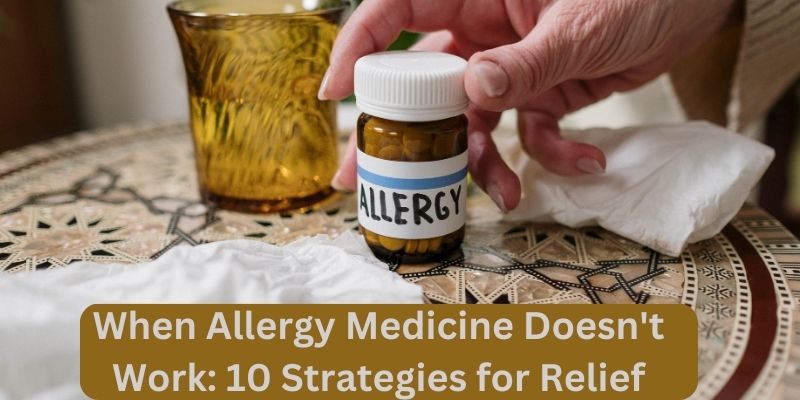Allergies can be a relentless adversary, causing sneezing, itching, congestion, and general discomfort. When allergy medicine fails to provide the expected relief, it can be incredibly frustrating. However, there’s no need to despair; there are several strategies you can employ to find relief and regain control over your allergy symptoms. In this article, we will provide the details of what to do when allergy medicine doesn’t work and offer practical solutions to help you breathe easier and live more comfortably.
10 Strategies for Relief When Allergy Medicine Doesn’t Work
Consult an Allergist
If your allergy symptoms persist despite taking over-the-counter allergy medication, it might be time to consult an allergist. Allergists are specialists trained to diagnose and treat allergies. They can conduct tests to identify specific allergens that trigger your symptoms and recommend personalized treatment plans, including prescription medications or allergen immunotherapy.
Change Your Medication
Not all allergy medications work the same way for everyone. Some individuals might respond better to different types of antihistamines or nasal corticosteroids. Consult with your healthcare provider to explore alternative medications that might be more effective for your specific allergies.
Address Underlying Allergies
Sometimes, persistent allergy symptoms can be a result of ongoing exposure to allergens in your environment. Consider making changes at home or work, such as using air purifiers, reducing allergen exposure, or implementing better cleaning practices. Identifying and avoiding triggers can make a significant difference.
Combine Medications
In some cases, combining different types of allergy medications can provide more effective relief. For instance, your doctor might recommend taking an antihistamine with a nasal corticosteroid spray for better control of your symptoms.
Explore Natural Remedies
Natural remedies like saline nasal rinses, steam inhalation, and local honey consumption are often suggested to complement allergy medication. While they may not replace prescription treatments, they can help alleviate symptoms and improve your overall comfort.
Adjust Your Diet
Certain foods can exacerbate allergy symptoms, so it’s essential to pay attention to your diet. Limiting dairy, processed foods, and sugary items can reduce inflammation and help manage allergies. Adding anti-inflammatory foods like omega-3-rich fish, leafy greens, and berries to your diet may also provide relief.
Keep Windows Closed
Allergens like pollen can easily enter your home through open windows and exacerbate your symptoms. During peak allergy seasons, keep your windows closed and use air conditioning with clean filters to maintain indoor air quality.
Manage Stress
Stress can worsen allergy symptoms. Employ relaxation techniques like meditation, yoga, or deep breathing exercises to reduce stress and improve your overall well-being. Lowering stress levels may also make your allergy medication more effective.
Consider Allergen Immunotherapy
If your allergies are severe and unresponsive to other treatments, allergen immunotherapy (allergy shots or sublingual tablets) can be a long-term solution. This therapy helps your body build immunity to specific allergens, reducing the severity of your symptoms over time.
Monitor Your Environment
Regularly check pollen and mold counts in your area to plan outdoor activities when allergen levels are lower. Utilize weather apps or websites that provide allergy forecasts to stay informed about potential triggers.
Conclusion
Living with allergies can be challenging, especially when your usual allergy medicine doesn’t provide relief. However, there are various strategies and approaches you can try to manage your symptoms effectively. Consult with healthcare professionals, consider alternative medications, and make lifestyle adjustments to reduce allergen exposure. By taking a proactive approach to your allergies, you can find the relief you need and enjoy a better quality of life. Remember, allergies can be managed, and with the right strategies, you can regain control and comfort in your daily life.
You may also like:
Unveiling the Mystery: Why Do Allergies Get Worse at Night?
Can a Humidifier Alleviate Allergies?
Can Allergies Cause Body Aches?
FAQs
Q:- Can I take more than the recommended dose of over-the-counter allergy medication if it’s not working?
Ans:- It’s essential to follow the recommended dosage instructions on the medication label or as prescribed by your healthcare provider. Taking more than the recommended dose can lead to side effects and may not necessarily provide better relief. If your current allergy medicine isn’t working, consult with your doctor to explore alternative options or combinations of medications that may be more effective for your specific allergies.
Q:- Are natural remedies a reliable substitute for allergy medication when it doesn’t work?
Ans:- Natural remedies like saline nasal rinses, steam inhalation, and local honey can offer some relief from allergy symptoms but are typically used as complementary treatments rather than substitutes for allergy medication. If your allergy medicine isn’t providing the desired relief, it’s advisable to consult with a healthcare professional who can recommend appropriate medications or therapies tailored to your specific needs.
Q:- How long does it take for allergen immunotherapy (allergy shots or tablets) to work if my current medication isn’t effective?
Ans:- Allergen immunotherapy is a long-term treatment that gradually builds immunity to specific allergens. You may not experience immediate relief, and it can take several months to a year before you notice significant improvements in your allergy symptoms. However, for individuals with severe allergies that don’t respond well to other treatments, allergen immunotherapy can be an effective and lasting solution when administered under the guidance of an allergist.
